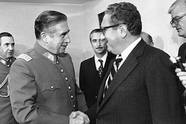The Roundup Top Ten for May 5, 2023

Shameful Echoes of the 1950s Lavender Scareby David K. JohnsonAt the height of the McCarthy era, a bipartisan congressional committee concluded that gay and lesbian personnel should be purged from government service because of the alleged "weakness of their moral fiber." Teaching this history could make students more able to recognize political moral panics today. |

Climate Policy Needs a Return to Land Reformby Jo GuldiIn the immediate aftermath of the Second World War, the United Nations' international development agenda took its cues from struggles for decolonization from Ireland to India, making the redistribution of rural land a top priority. Is this the key to more effective climate change mitigation? |

On the History, Alito's Wrong: Attacks on Justices Nothing Newby Kevin M. KruseEven if Samuel Alito or Clarence Thomas were burned in effigy or impeached, those challenges to their judicial integrity would be very much precedented. |

Wins at Amazon and Starbucks Aside, Independent Unions Face Big Challengesby Erik LoomisThe improvised and worker-led efforts to organize the new economy giants has led some commenters to proclaim the end of big labor. A labor historian says that workers still need the resources and support of legacy unions – if they commit to organizing new workplaces – to beat employers determined to bust unions. |

How to Get Americans To Embrace Constitutional Amendments Againby Kate Shaw and Julie K. SukAs recent Supreme Court decisions on guns and abortion rights have made many Americans fear the loss of basic rights, reviving the effort to pass the Equal Rights Amendment can remind Americans that nine people in robes don't have to be the final authority on the Constitution. |

Abortion Restrictions Aimed at Minors Will Never Stop Thereby Mary ZieglerIn the years after Roe v. Wade, abortion opponents recognized that children don't have the same constitutional protections as adults and that many voters would separate "parental rights" from the organized effort to roll back abortion rights. The ploy was effective, and is being repeated in legislation banning travel for abortion. |

The Police Aren't Part of Change in Chicagoby Dan BergerA historian critiquing a recent book on Black Lives Matter argues that the political, fiscal and cultural influence of police is so broad that it's impossible to think of meaningful social reform in a society that includes modern police departments. |

How Labor Won the Repeal of "Right to Work" in Michiganby Jennifer StandishLabor and its political allies must recognize the importance of state level legislation and coalition-building and resist the temptation to nationalize politics if they hope to repeat their success in Michigan and roll back the state-by-state advance of anti-labor legislation. |

Should Jimmy Carter's Coming Departure Change How We Memorialize Presidents?by Lindsay M. Chervinsky"When does respect and gratitude transfer from the office to the person—and when does that become inappropriate in a republic?" A presidential historian argues for emphasizing Carter's service while a private citizen as a way of emphasizing that the president is a first-among-equals citizen. |

Would the American Right Crash the Economy for Political Advantage? Ask Chileby Ruth Ben-GhiatFrom the moment socialist Salvador Allende was declared the winner of Chile's 1970 election, Henry Kissinger and CIA director Richard Helms were at work to "make the economy scream" to create favorable conditions for a right-wing coup. |